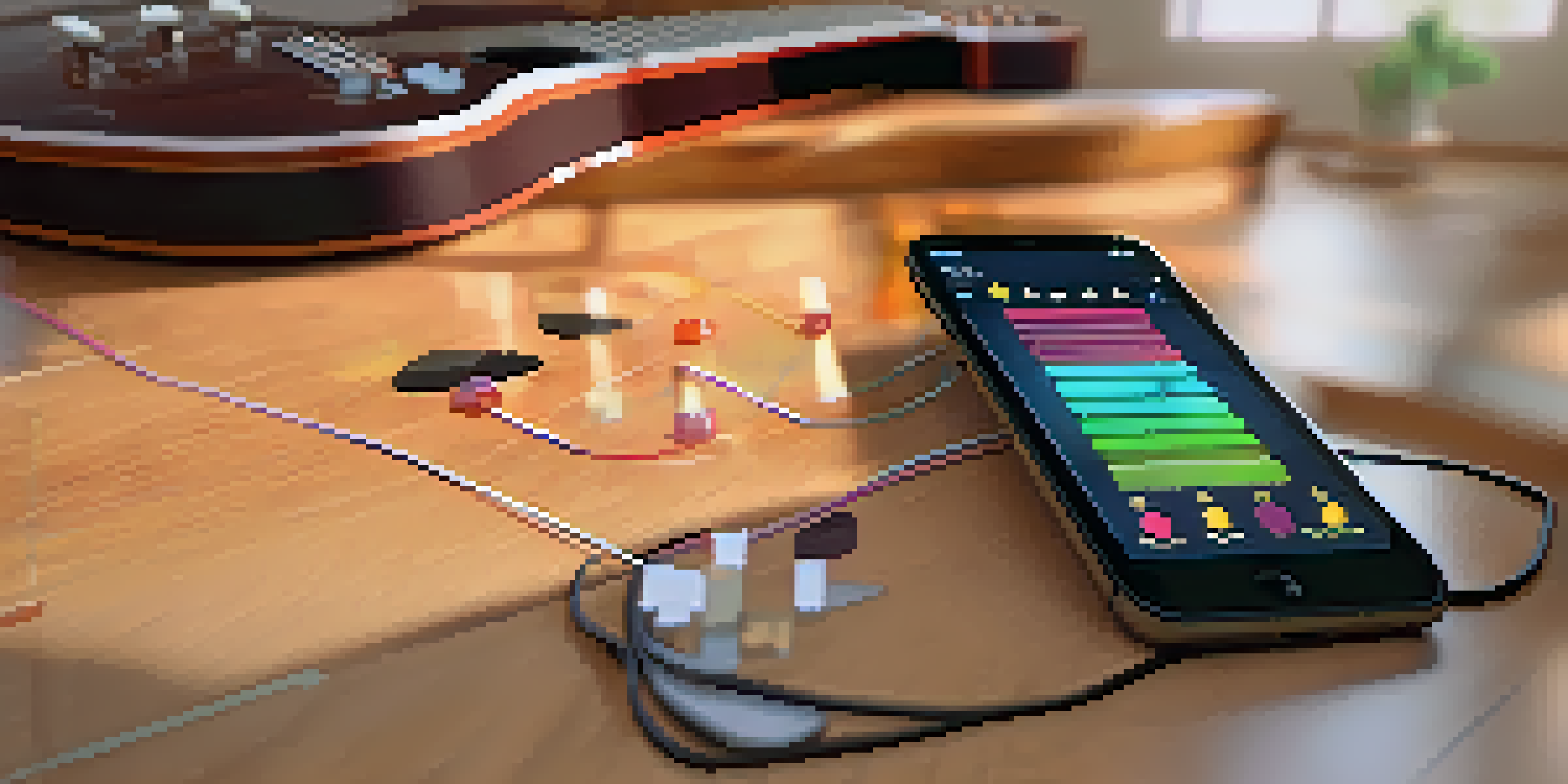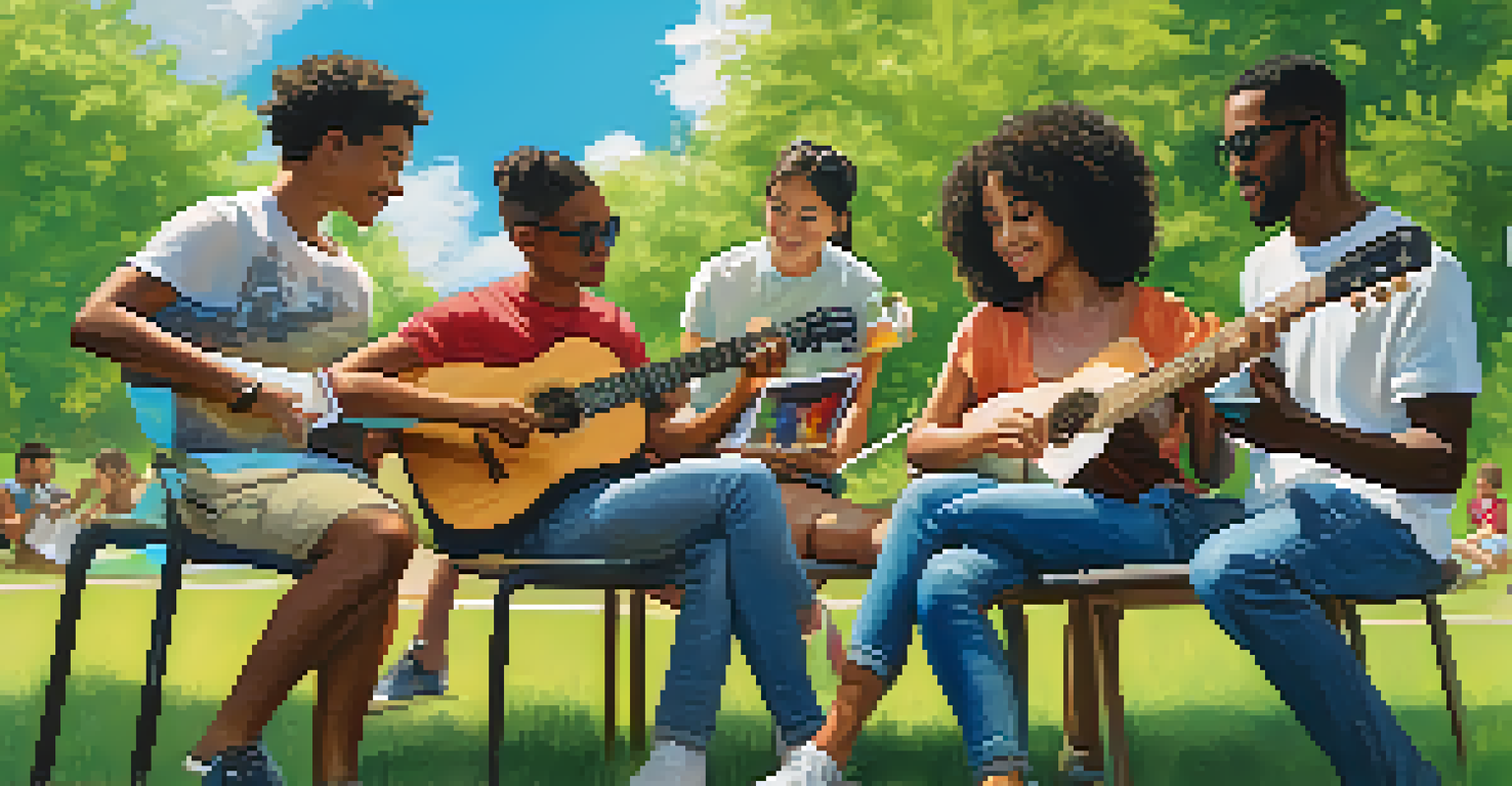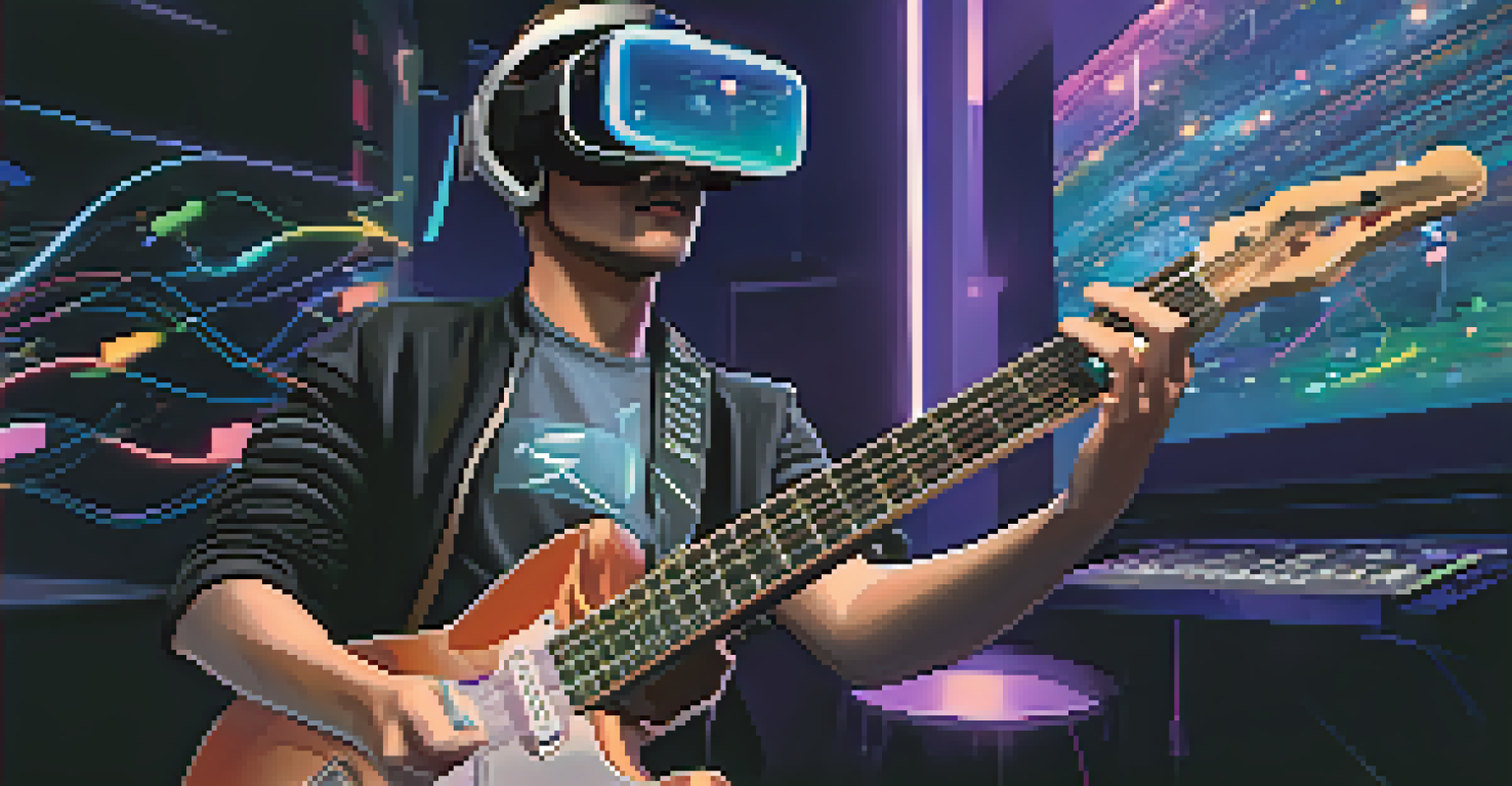The Evolution of Guitar Learning Apps: A Comprehensive Guide

The Birth of Guitar Learning Apps in the Digital Age
The journey of guitar learning apps began in the early 2000s, coinciding with the rise of smartphones. As technology advanced, developers recognized the potential of mobile devices to deliver music education right to users' fingertips. This marked a significant shift from traditional teaching methods, making it easier for beginners to access learning materials anytime, anywhere.
Technology is best when it brings people together.
Initially, these apps provided basic tutorials and chord charts, serving as supplementary tools. However, as user demand grew, developers began to incorporate more interactive features, such as video lessons and play-along tracks. This evolution laid the groundwork for a more engaging learning experience, appealing to a wider audience, from casual learners to serious musicians.
Today, guitar learning apps have evolved into comprehensive platforms that offer a variety of learning styles. They cater to visual, auditory, and kinesthetic learners, ensuring that everyone can find a method that resonates with them. This adaptability continues to drive their popularity, as users seek personalized approaches to mastering the guitar.
Key Features that Revolutionized Guitar Learning Apps
One of the standout features of modern guitar learning apps is the integration of interactive technology. For instance, apps now often include chord recognition tools that listen to users play and provide real-time feedback. This immediate response helps learners correct mistakes and build confidence, transforming practice sessions into productive experiences.

Additionally, many apps now offer gamification elements, turning learning into a fun challenge. Users can earn points, unlock new levels, and compete with friends, making practice feel less like a chore and more like a game. This engaging approach keeps users motivated and encourages regular practice, which is key to mastering the guitar.
Evolution of Guitar Learning Apps
Guitar learning apps have transformed music education by providing interactive and personalized learning experiences through technology.
Furthermore, the availability of diverse content, from beginner lessons to advanced techniques, ensures that there's something for everyone. Users can explore various genres, styles, and techniques, allowing them to personalize their learning journey. This tailored experience is a significant leap forward from the one-size-fits-all approach of traditional classes.
The Role of Community in Guitar Learning Apps
Community features have become a vital aspect of guitar learning apps, fostering connections among users. Many platforms now include forums, chat groups, and social media integrations, allowing learners to share tips, progress, and experiences. This sense of belonging can be incredibly motivating, as users encourage one another and celebrate successes together.
The beautiful thing about learning is that no one can take it away from you.
In addition to peer support, some apps offer access to professional instructors and masterclasses. This blend of community and expert guidance provides learners with a well-rounded education, bridging the gap between self-study and formal instruction. Users can gain insights that might not be available through solo practice, enriching their overall experience.
Moreover, community-driven challenges and contests keep users engaged and striving for improvement. By participating in these events, learners can showcase their skills and receive feedback from both peers and professionals. This collaborative environment not only enhances learning but also builds friendships among aspiring musicians.
The Impact of Artificial Intelligence on Learning
Artificial intelligence (AI) has made its mark on guitar learning apps, significantly enhancing the user experience. AI-driven tools can analyze a user's playing style and suggest personalized practice routines, ensuring that learners focus on areas that need improvement. This tailored approach promotes efficient learning and helps users progress at their own pace.
Moreover, AI can facilitate real-time feedback on performance, offering insights that traditional methods may overlook. For instance, apps can identify common mistakes, such as incorrect finger placement or timing issues, and provide targeted exercises to address them. This immediate feedback loop accelerates the learning process and instills a sense of achievement.
Community Enhances Learning
The integration of community features in guitar apps fosters connections among users, offering support and motivation through shared experiences.
As AI technology continues to evolve, we can expect even more sophisticated features in guitar learning apps. Future advancements may include virtual instructors that simulate one-on-one lessons, making high-quality education accessible to anyone, regardless of location. This potential makes AI an exciting frontier for the future of guitar learning.
Popular Guitar Learning Apps and Their Unique Offerings
There are several guitar learning apps on the market, each with its unique features and strengths. For example, Yousician is known for its gamified learning experience, providing users with interactive lessons and instant feedback. This app caters to all skill levels, making it an excellent choice for beginners and advanced players alike.
Another popular option is Fender Play, which focuses on structured lessons and a vast library of songs. Users can learn their favorite tracks while developing essential skills, promoting a sense of accomplishment through immediate application. This blend of theory and practice helps learners stay engaged and motivated.
Lastly, Ultimate Guitar is a go-to app for those looking to explore a wide range of tabs and chords. With a massive database of user-generated content, learners can find virtually any song they wish to play. This extensive resource empowers users to take charge of their learning, diving into the music they love.
Challenges and Limitations of Guitar Learning Apps
Despite their many advantages, guitar learning apps are not without challenges. One significant limitation is the lack of personalized feedback that comes from face-to-face lessons. While apps can provide general tips and correction tools, they might not catch nuanced mistakes that a skilled instructor would notice in real time.
Additionally, users may struggle with self-discipline and motivation when learning independently. Without the accountability of a teacher or a structured class schedule, some learners may find it easy to lose focus or abandon their practice altogether. This highlights the importance of establishing a consistent routine and setting personal goals.
AI's Role in Personalized Learning
Artificial intelligence in guitar learning apps tailors practice routines and feedback, promoting efficient and effective skill development.
Finally, the overwhelming number of available resources can lead to confusion. With various apps and platforms offering different approaches, learners may find it challenging to choose the right one for their needs. This emphasizes the importance of research and exploration to find the best fit for their personal learning style and musical goals.
The Future of Guitar Learning Apps: What's Next?
Looking ahead, the future of guitar learning apps appears bright, with ongoing advancements in technology and user experience. We can expect to see even more immersive features, such as virtual reality (VR) lessons that simulate real-life playing environments. This innovative approach could revolutionize how users interact with their instruments and practice.
Additionally, as the demand for personalized learning experiences grows, more apps may integrate machine learning algorithms. This technology can analyze user data to continuously adapt lessons and suggestions, ensuring that learners receive the most relevant content based on their progress and preferences. The result will be an even more tailored and effective learning journey.

Overall, the evolution of guitar learning apps will continue to shape the way musicians learn and connect with their passion. By embracing new technologies and fostering community, these platforms will play an essential role in nurturing the next generation of guitarists, making music education accessible to all.